This article first appeared in the summer 2006 issue of the Expert Witness.
In 1997 and 1999, Economica conducted surveys of the cost of obtaining household services. At that time, we found that housecleaners in Calgary and Edmonton charged approximately $13.50 per hour; and that handymen charged approximately $24.00 per hour.
Since that time, we have estimated the current costs of household services by increasing the 1999 estimates by the intervening rate of wage inflation in Alberta. This implies, for example, that our estimate of the cost of housecleaners was approximately $16.00 per hour in 2005.
Increasingly, however, we have become aware that our estimates differ from the rates that prevail in Alberta, particularly in Calgary and Edmonton. The informal evidence available to us suggests, for example, that most housecleaners charge significantly more than $20 per hour.
For this reason, in late 2005 and early 2006 we conducted a new survey of household costs. In this survey, we obtained housecleaning, handyman, landscaping and snow removal, child care, and home care/meal preparation rates from a large sample of agencies and individuals in both Calgary and Edmonton, and housecleaning rates for smaller samples in Lethbridge, Grande Prairie, and Red Deer. We report the results of that survey in this article.
Housecleaning
Using newspapers and the Yellow Pages, we identified thirteen individuals or agencies in Calgary and ten in Edmonton that provide housecleaning services. We asked each of them to provide their hourly rate to clean a 1,600 square foot, two-story house (assuming there were not pets and that the cleaner would not be responsible for the basement). In Calgary, the average rate was $28.00 per hour ($26.22 if the top two rates are excluded), with a range from $21.25 to $38.00. As can be seen in Table 1, the most common rates (from seven agencies) were in the range of $24.00 to $27.50 per hour. Two of the thirteen rates were from individuals, who quoted $22.50 and $24.00 per hour, respectively.
In Edmonton, the average rate was slightly lower, at $26.10 per hour ($24.77 without the top rate); and the most common rates (from six agencies) ranged from $22.00 to $25.00 per hour. (See Table 1.)
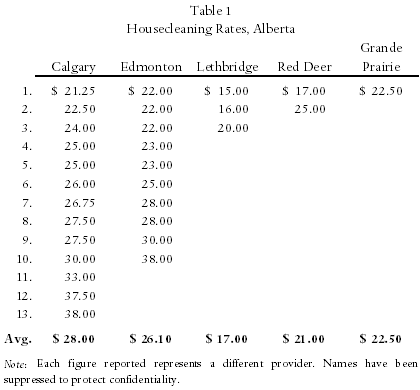
We were less successful at obtaining quotes in the other regions, obtaining only three in Lethbridge, two in Red Deer, and one in Grande Prairie. In those cities, the average hourly rates were: Lethbridge, $17.00; Red Deer, $21.00; and Grande Prairie, $22.50.
With the sole exception of the $17.00 figure for Lethbridge, it is seen that all of these figures significantly exceed the $16.00 rate that we estimated by increasing the 1999 rate by the average rate of wage inflation in Alberta.
We suspect that there are two reasons for the deviation of our predicted estimates from the actual figures, as indicated by the survey. First, it may be that the wages of individual housecleaners have been rising more quickly than the average. Second, anecdotal evidence suggests that the housecleaning sector has increasingly become dominated by professional agencies, whose hourly rates exceed the wages they pay to their employees, (in many cases by a significant margin).
This raises an important question: if employees are being paid, say, $14 to $17 per hour, and agencies are charging $25 to $35 per hour, why don’t individual cleaners leave their current positions and set up in competition with their former employers? Why doesn’t a worker who has been earning $15 per hour advertise his or her services at $20 to $30 per hour?
We suspect that the answer to this question derives from three factors. First, many cleaner-employees may lack the business skills to allow them to establish their own companies. These individuals may prefer to work for a company that offers them guaranteed hours and wages, as low as those wages may be, rather than take the risks of setting up their own firms.
Second, commercial firms often incur costs – for example, for cleaning supplies, advertising, insurance, transportation, administration, and employee bonding – in excess of the wages they pay to their employees. Individuals who established their own businesses would have to bear these costs themselves.
Finally, commercial firms may be better able than individual cleaners to develop reputations for reliable service. If a cleaner is sick or otherwise unable to work, a firm can often replace that individual with another employee; whereas if self-employed individuals are unable to meet their commitments, their jobs go undone. Customers may be willing to pay a premium for the more reliable service.
Regardless of the answer to this question, however, the fact is that it would be very difficult to hire a reliable housecleaner in Calgary or Edmonton for less than $20 per hour – and the expected cost is closer to $26 to $28 per hour.
Handyman
We obtained the names of handyman services in Calgary and Edmonton from newspapers and the internet. In each case, we asked agencies to quote for the hourly rate to either paint an interior room or repair a deck. The results are reported in Table 2. With the exception of one “outlier,” a $15.00 per hour rate quoted by a non-bonded, uninsured, non-professional student company, the rates in both cities fell consistently in the $30.00 to $40.00 per hour range, with an average of approximately $33.00 per hour in both cities.
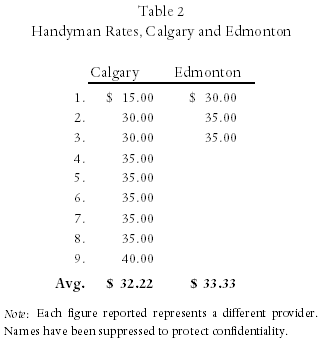
Landscaping and snow removal
Landscaping and snow removal firms were identified online or from the Yellow Pages. In the case of landscaping, firms were asked for their hourly rates to mow lawns and conduct yard clean-up. The four firms we identified in Edmonton had slightly higher hourly rates, approximately $38.00 per hour, than did the seven firms surveyed in Calgary, where the average was approximately $33.00 per hour. (See Table 3.) It is possible that the difference between the two cities arose simply from the small sample size in Edmonton.
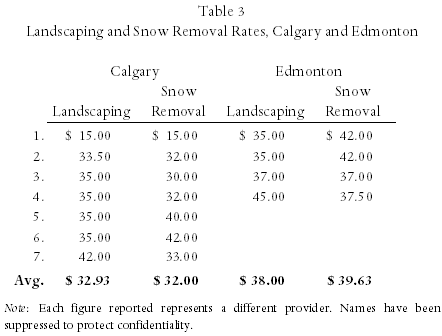
Child care
There are two primary methods of providing (commercial) child care: nannies, who come in to the home, and day care. We obtained information about nanny services online and from the newspapers; information about daycare services was obtained from the Yellow Pages.
In Table 4, we provide information about “live-in” and “live-out” nannies in Calgary. Unlike Tables 1-3, we do not present information about individual rates, as we collected 30 observations. Rather, we report the number of observations in each of a number of ranges.
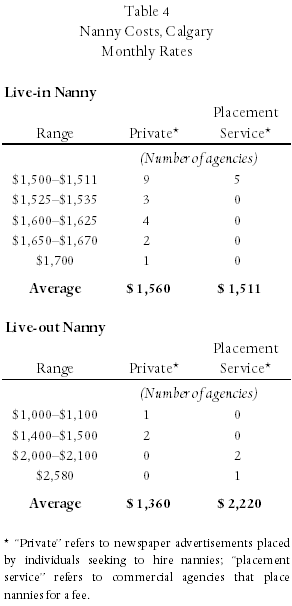
The first column in Table 4 represents monthly rates that were offered in advertisements in the Calgary Herald by families who were seeking to hire nannies. The second column represents rates that private nanny agencies charge for placements.
We also obtained some information concerning the cost of nannies in Edmonton. (These data are not reported in tables as we had insufficient responses.) As in Calgary, the one nanny placement service we were able to identify charged $1,510.82 per month; and the hourly rate for (private) live-out nannies were from $8.00 to $16.00 per hour, with an average of approximately $11.75.
With respect to live-in nannies, the private and commercial rates were in agreement, at approximately $1,500 per month, or approximately $8.00 per hour. (Employers are required to pay at least the minimum wage for 44 hours per week, or $1,510.82 per month.) With respect to live-out nannies, however, private rates in Calgary, at $1,360 per month, were significantly less than commercial rates, at $2,220 per month, (or $11.50 per hour).
We suspect that the commercial rates in Calgary are more reliable estimates of the actual costs than are the private. First, the private rates in Edmonton are virtually identical to the commercial rates in Calgary. And, second, although we would anticipate that live-in nannies, who receive room and (some) board, would be paid less than live-out nannies, who have to pay their own room and board, the live-in rates offered in the Calgary newspapers were more than live-out rates.
With respect to day care services, (Table 5), we found that, for the youngest children, there was a significant concentration of fees around $700 per month and another concentration around $800, with an overall average of $720 (pre-toddlers) to $740 (babies) per month in Calgary, (or approximately $4.00 per hour per child), and $630 to $855 per month in Edmonton. As we found only three day care centres that would look after babies in Edmonton, we prefer the Calgary figure. The pre-toddler figure appears to be lower in Edmonton than in Calgary because of the presence of a number of centres associated with the YMCA that provide low-cost care for this group.
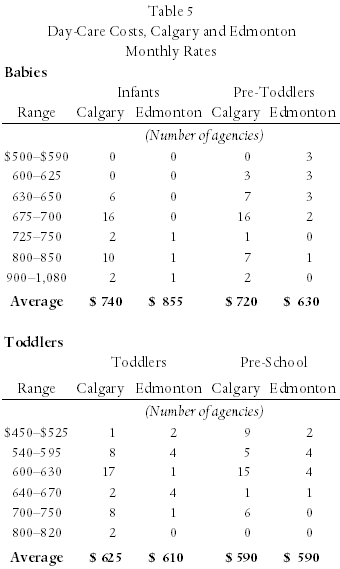
With respect to older pre-school children, we found that almost half of the agencies charged between $600 and $630 per month, with an overall average of $590 to $625 (approximately $3.00 per hour).
In Table 6, we report day care charges for pre- and after-school care for school-age children in Calgary. It is seen there that the most common rate is $300 per month, with an average across 23 agencies of $280. The two agencies we identified in Edmonton charged $335 and $320, respectively.

Home care and meal preparation
Through the Yellow Pages and the internet, we were able to identify six agencies in Calgary that provide generalized home care services, such as meal preparation, light housekeeping, grocery and clothes shopping, grooming and dressing, bed-making, and bathing. Five of these six agencies charged between $21.00 and $23.00 per hour, with the sixth charging $17.95. If the latter is excluded, the average hourly rate was $22.00. We were unable to obtain rates for similar services in Edmonton.
Calgary’s Kerby Center also provided us with a list of six agencies that would prepare meals at home. Five of those six charged between $15.00 and $20.00 per hour, with an average of $17.50. The sixth agency charged $30.00 per hour, but was operated by a nutritionist who would design healthy menus, in addition to preparing meals.
Summary
In this article, we have reported the results of a survey of household services providers in Alberta. Two outcomes are very clear. First, it is inappropriate to use a single, hourly rate to evaluate all such services. Whereas child care services cost approximately $3.00 to $4.00 per hour per child (assuming that nannies care for two children on average), housecleaning services cost more than $25 per hour, and handyman and gardener services cost approximately $33 per hour.
Second, the convention of using $12 to $16 per hour for household services is insupportable. All of the services that were identified in our survey either cost significantly more than that or significantly less.
Proposal
In its publication As Time Goes by . . . Time Use of Canadians (Catalogue 89-544-XPE) Statistics Canada provides data concerning the amounts of time spent on six types of “household work and related activities.” These are: cooking/washing up, house cleaning and laundry, maintenance and repair, other household work, shopping for goods and services, and primary child care. For the purposes of calculating the costs of household services, we propose to combine “cooking/washing up” with “shopping” and evaluate that category at the approximate average rate for home care and meal preparation, $20.00 per hour.
We will combine “maintenance and repair” with “other household work” (a large portion of which consists of “gardening and ground work”) and evaluate the resulting services at the landscaping, snow removal, and handyman services rate of approximately $32.00 per hour.
We will evaluate “house cleaning and laundry” at the rate for housecleaning services. For the purposes of our reports, we propose to use the conservative rate of $25.00 per hour in Calgary and Edmonton, and $20.00 per hour elsewhere.
We will assume that it costs $700 per month to care for each baby, $600 to care for each toddler/pre-school child, and $275 per month to provide after-school care for each primary school-aged child.
Finally, we will continue to assume that replacement workers for the non-childcare services will perform these tasks more efficiently than the plaintiff would have. Specifically, we will assume a 25 percent reduction in the hours requiring replacement to reflect increased productivity on behalf of hired replacements. We do not make this adjustment for the childcare services, since if a child needs (say) three hours of after-school care, there is no opportunity to somehow provide this care in only 2½ hours.
![]()